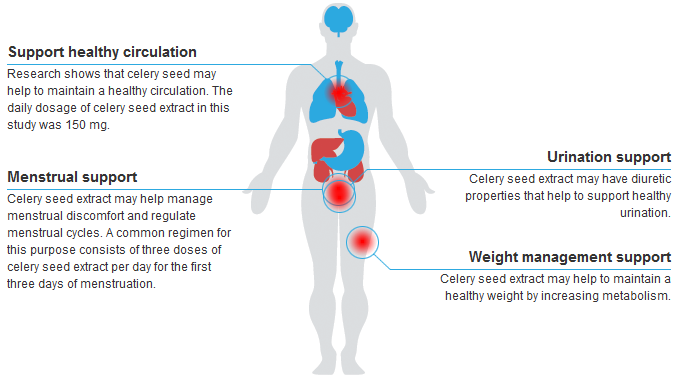Celery seed extract, known for its diuretic properties, supports menstrual health, circulation, urination, and weight management, offering relief from discomfort and aiding in regulating cycles.
Celery (Apium graveolens) is a member of the Apiaceae family, which also includes carrots and parsley. Celery plants can exceed three feet in height, and the leaves can grow to more than two inches in length. The white flowers are about 1/10-inch in diameter and grow in dense clusters called umbrels. Celery “seeds” are about 1/16-inch in diameter, although they are the fruits of the plant.
Celery is used as a vegetable throughout the world. The Pascal variety of celery is most common in North America and is characterized by stalks that grow in tight, straight bunches. The most commonly used part of Pascal celery is the vertical leaf stalk or petiole. The leaves have a sharp aromatic flavor and are typically used to flavor soups. The celeriac variety of celery is more common in Europe and is primarily cultivated for its large bulbs.
Celery may also be grown for its seed, especially in temperate climates. Celery seeds have a strong flavor, which comes from a volatile oil called apiol. Celery seeds are primarily used as a spice, although they are also common in many pharmaceutical and cosmetic products.
The primary use of celery seed is to support menstruation. It may also be used for other purposes such as supporting healthy circulation, urination, and healthy weight management.
Research shows that celery seeds may help to maintain a healthy circulation. The daily dosage of celery seed extract in this study was 150 mg.
Celery seed extract may help manage menstrual discomfort and regulate menstrual cycles. A common regimen for this purpose consists of three doses of celery seed extract per day for the first three days of menstruation.
Celery seed extract may have diuretic properties that help to support healthy urination.
Celery seed extract may help to maintain a healthy weight by increasing metabolism.

The most common signs that you may need celery seed include menstrual symptoms such as discomfort and irregular periods. Digestive signs such as poor digestion, flatulence and irregular bowel movements may also mean that you may benefit from celery seed. Signs of water retention such as bloating can mean that celery seed may help you. Addition problems that may indicate you need this supplement include joint discomfort, fatigue and insomnia.
Shipping calculated at checkout
